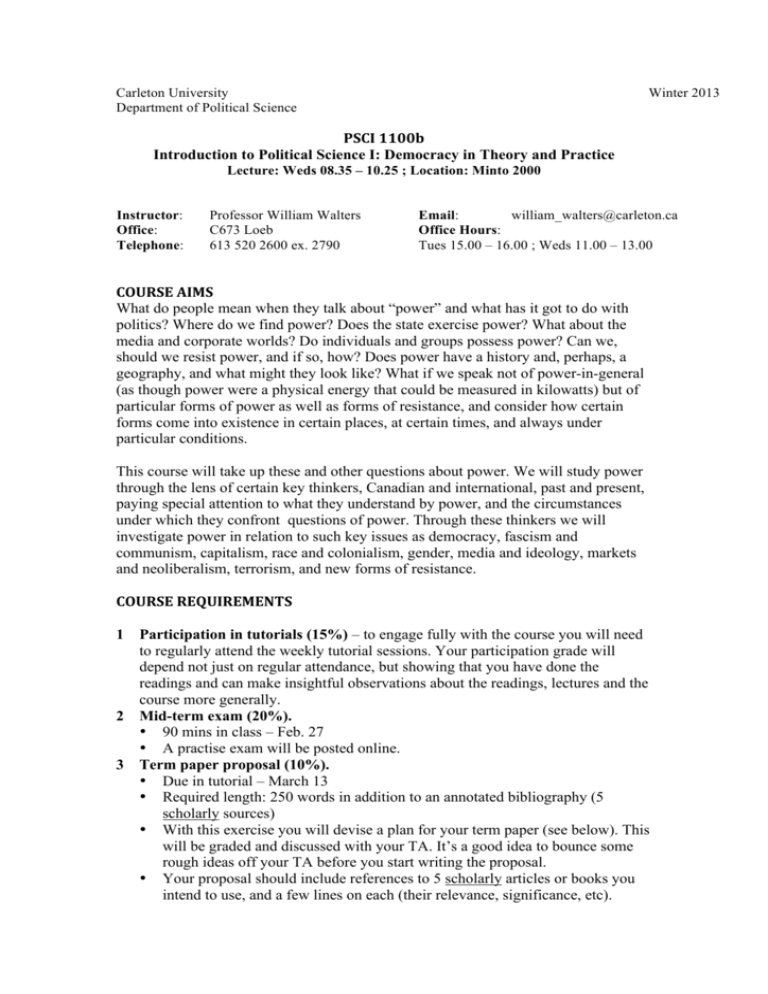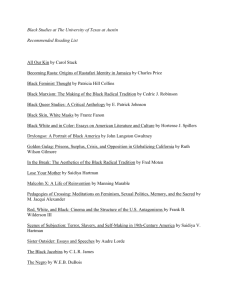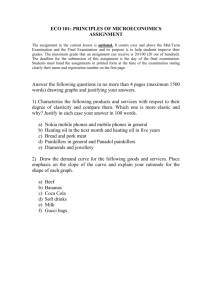PSCI 1100b Syllabus
advertisement

Carleton University Department of Political Science Winter 2013 PSCI 1100b Introduction to Political Science I: Democracy in Theory and Practice Lecture: Weds 08.35 – 10.25 ; Location: Minto 2000 Instructor: Office: Telephone: Professor William Walters C673 Loeb 613 520 2600 ex. 2790 Email: william_walters@carleton.ca Office Hours: Tues 15.00 – 16.00 ; Weds 11.00 – 13.00 COURSE AIMS What do people mean when they talk about “power” and what has it got to do with politics? Where do we find power? Does the state exercise power? What about the media and corporate worlds? Do individuals and groups possess power? Can we, should we resist power, and if so, how? Does power have a history and, perhaps, a geography, and what might they look like? What if we speak not of power-in-general (as though power were a physical energy that could be measured in kilowatts) but of particular forms of power as well as forms of resistance, and consider how certain forms come into existence in certain places, at certain times, and always under particular conditions. This course will take up these and other questions about power. We will study power through the lens of certain key thinkers, Canadian and international, past and present, paying special attention to what they understand by power, and the circumstances under which they confront questions of power. Through these thinkers we will investigate power in relation to such key issues as democracy, fascism and communism, capitalism, race and colonialism, gender, media and ideology, markets and neoliberalism, terrorism, and new forms of resistance. COURSE REQUIREMENTS 1 2 3 Participation in tutorials (15%) – to engage fully with the course you will need to regularly attend the weekly tutorial sessions. Your participation grade will depend not just on regular attendance, but showing that you have done the readings and can make insightful observations about the readings, lectures and the course more generally. Mid-term exam (20%). • 90 mins in class – Feb. 27 • A practise exam will be posted online. Term paper proposal (10%). • Due in tutorial – March 13 • Required length: 250 words in addition to an annotated bibliography (5 scholarly sources) • With this exercise you will devise a plan for your term paper (see below). This will be graded and discussed with your TA. It’s a good idea to bounce some rough ideas off your TA before you start writing the proposal. • Your proposal should include references to 5 scholarly articles or books you intend to use, and a few lines on each (their relevance, significance, etc). 4 3 4 5 • A template will be posted online. Term paper (25%) • Due in lecture – April 3 • Required length: 2500 words plus a bibliography. • Your paper should use at least 10 relevant scholarly sources (e.g., from reputable scholarly journals). • Your essay will offer a critical assessment of one of the thinkers and/or themes of the course. For example, you might address the question: ‘Is Dahl’s pluralist theory still relevant to democracy today?’ Your essay will need to utilize additional sources to those given on the reading list. Final exam (150 mins - during exam period) (30%). Further departmental and university requirements are listed on the last page of this handout. A practice exam will be posted online. Multimedia sources – a number of films, video clips and the odd song will be played in most weeks. Please note: mid-term and final exams will test your understanding of course readings, lectures and these multimedia sources. Late penalties - 2% of grade per day for each day after the due date (not including weekends). Exceptions and extensions will only be granted in the case of special circumstances (e.g., illness, family bereavement) and where you have appropriate documentation (e.g., doctor’s note). COURSE MATERIAL All required readings are available online, either through the library’s ARES marked with [*]), or open access. LECTURES AND THEMES 1. Introduction (Jan. 9) 1. Karl Marx: Capitalism and Class Struggle (Jan. 16) Selections from Marx, in Anthony Giddens and David Held (eds) Classes, Power, and Conflict, Berkeley: University of California Press, 1982, pp.19-28.* Janine Brodie, ‘Politics, Power and Political Science’ in Janine Brodie (ed.) Critical Concepts: An Introduction to Politics (4th edition), Toronto: Prentice Hall, 2008, pp.2-22. (This article is also relevant to the session on Dahl and pluralism).* Leo Panitch, ‘Thoroughly Modern Marx’, Foreign Policy, 15 April, 2009. http://www.foreignpolicy.com/articles/2009/04/15/thoroughly_modern_marx?page=full Films: Richard Wolff, ‘How class works’ (2011) http://rootsofhealthinequity.org/how-class-works.php (in class) ‘Manifestoon’, http://vimeo.com/33308685 Coronet Instructional Video on Capitalism (1947) http://www.youtube.com/watch?v=TtOtV-gE3YQ 2. Robert Dahl: Polyarchy and Pluralism (Jan. 23) Robert Dahl, Who Governs? Democracy and Power in an American City, New Haven: Yale University Press, 1961, pp.1-9; 85-6, 305-310.* Mark Haugaard, ‘Lukes’ (Introduction) and Steven Lukes, Power: A Radical View (excerpt) in Haugaard (ed.) Power: A Reader, New York: Palgrave, 2002: 38-44; 50-57.* (see also reading by Brodie, week 1) 3. George Orwell and Totalitarianism (Jan. 30) Selection from “Nineteen Eighty-Four” in Orwell, The Orwell Reader, NewYork: Harcourt, Brace and World, pp.396-419.* Hannah Arendt, Eichmann in Jerusalem: A Report on the Banality of Evil, New York: Penguin, pp. 171-175; 230-233.* Film: George Orwell’s 1984 (2001) 4. Frantz Fanon: Colonial Power, Anti-Colonial Struggles (Feb. 6) Frantz Fanon, The Wretched of the Earth, New York: Grove Press, 1963, pp.35-46; 70-74.* Manfred Steger, ‘Third World Liberationisms: Gandhism and Fanonism’, extract from The Rise of the Global Imaginary, Oxford: Oxford University Press, 2008, pp.138-150.* Film: Black Skin, White Mask: Frantz Fanon (1995) Babakiueria (1986) http://www.youtube.com/watch?v=SHK308_MTiU 5. Michel Foucault: Microphysics of Power (Feb. 13) Michel Foucault, ‘The Means of Correct Training’ and ‘Panopticism’ in Paul Rabinow (ed.) The Foucault Reader, New York: Pantheon, 1984, pp.188-213.* Gilles Deleuze, ‘Postscript on Societies of Control’, October v.59, 1992: 3-7. https://files.nyu.edu/dnm232/public/deleuze_postcript.pdf Andrew Neal, ‘Michel Foucault’ in J.Edkins and N. Vaughan-Williams (eds) Critical Theorists and International Relations, New York: Routledge, 2009, pp.161-170.* Films: TBC 6. Winter Break (Feb. 18 - 22) 7. Mid-Term Exam (90 mins in class) (Feb. 27) 8. Jane Jacobs and the Power of Community (Mar 6) Jane Jacobs, ‘The uses of sidewalks: safety’ in Death and Life of Great American Cities, New York: Random House, 1961, pp.29-54.* Marshall Berman, ‘Robert Moses: The Expressway World’ in All That Is Solid Melts Into Air, New York: Verso, pp.290-311.* Film: TBC 9. Marilyn Waring on Work, Gender and Value (Mar 13) Marilyn Waring, If Women Counted: A New Feminist Economics. New York: Harper Collins, 1988, pp.14-45.* Meg Luxton and Leah Vosko, ‘Where Women’s Efforts Count: The 1996 Census Campaign and “Family Politics” in Canada’, Studies in Political Economy #56 (1998). http://spe.library.utoronto.ca/index.php/spe/article/download/6840/3812 Film: Who’s Counting: Marilyn Waring on Sex, Lies and Global Economics (1995) Term Paper Proposal due in your tutorial – Mar. 13 10. Naomi Klein, Symbolic Power, and the Rule of Markets (Mar. 20) Naomi Klein, No Logo: Taking Aim at the Brand Bullies, Toronto: Knopf, 2000., pp, TBC. Naomi Klein, ‘How corporate branding has taken over America’, The Guardian, 16 January 2010. http://www.guardian.co.uk/books/2010/jan/16/naomi-klein-branding-obama-america The Economist, ‘Why Naomi Klein needs to grow up’, The Economist 11/9/2002, (365/8298, p.70) http://web.archive.org/web/20021113145543/http://economist.com/printedition/displayStory.cfm? Story_ID=1429429 Film: No Logo: Brands, Globalization, Resistance (2003) 11. Michael Ignatieff: Rights, Evils, Exceptions, and The War on Terror (Mar 27) Michael Ignatieff, The Rights Revolution, Toronto: Anansi, 2000, pp. 1-26.* Michael Ignatieff, ‘Lesser Evils’, New York Times (Magazine), May 2, 2004. http://www.nytimes.com/2004/05/02/magazine/lesser-evils.html?pagewanted=all&src=pm Conor Gearty, ‘With a little help from our friends. Torture is wrong and ineffective. So why is it making a comeback?’, Index on Censorship 34(1), 2005: 46-53. http://blog.indexoncensorship.org/wp-content/uploads/2009/10/Gearty.pdf Further reading Laurie Taylor, ‘No more Mr Nice Guy’, The New Humanist 120(5), 2005. http://newhumanist.org.uk/1299/no-more-mr-nice-guy-laurie-taylor-on-michael-ignatieff Film: TBC 12. Conclusion, Review & Exam Preparation (April 3) Term Paper handed in at lecture (April 3) *********** Accommodations: Students with disabilities requiring academic accommodations are encouraged to contact a coordinator at the Paul Menton Centre to complete the necessary letters of accommodation. Then, make an appointment to discuss your needs with the Instructor at least two weeks prior to the first in-class or ITV test. This is to ensure sufficient time to make the necessary accommodation arrangement. Please note the following deadline for submitting completed forms to the Paul Menton Centre: November 1 for the December examination period and March 7 for the April examination period. Accommodation for religious observances is provided by the University. Please consult the instructor. Plagiarism: The Undergraduate Calendar defines plagiarism as: "to use and pass off as one's own idea or product, work of another without expressly giving credit to another." The Graduate Calendar states that plagiarism has occurred when a student either: (a) directly copies another's work without acknowledgment; or (b) closely paraphrases the equivalent of a short paragraph or more without acknowledgment; or (c) borrows, without acknowledgment, any ideas in a clear and recognizable form in such a way as to present them as the student's own thought, where such ideas, if they were the student's own would contribute to the merit of his or her own work. Instructors who suspect plagiarism are required to submit the paper and supporting documentation to the Departmental Chair who will refer the case to the Dean. Oral Examination: At the discretion of the instructor, students may be required to pass a brief oral examination on research papers and essays. Duplicate Assignments: It is not permitted to hand in the same assignment to two or more courses. Submission and Return of Term Work: Papers must be handed directly to the instructor and will not be date-stamped in the departmental office. Attach a stamped, self-addressed envelope if you wish to have your assignment returned by mail. The departmental mail-slot is intended for overnight late papers only. Please note that assignments sent via fax or email will not be accepted. Final exams are intended solely for the purpose of evaluation and will not be returned. Course Requirements: Students must fulfill all course requirements in order to achieve a passing grade. Failure to hand in any assignment will result in a grade of F. Failure to write the final examination will result in a grade of ABS. FND (Failure – No Deferred) is assigned when a student's performance is so poor during the term that they cannot pass the course even with 100% on the final examination. In such cases, instructors may use this notation on the Final Grade Report to indicate that a student has already failed the course due to inadequate term work and should not be permitted access to a deferral of the examination. Deferred final exams are available ONLY if the student is in good standing in the course.






